- Home
- Aaron Polson
Thirteen Shadows: Ghost Stories
Thirteen Shadows: Ghost Stories Read online
THIRTEEN SHADOWS: GHOST STORIES
by
AARON POLSON
SMASHWORDS EDITION
Copyright 2011 by Aaron Polson
All rights reserved. Without limiting the rights under copyright reserved above, no part of this publication may be reproduced, stored in or introduced into a retrieval system, or transmitted, in any form, or by any means (electronic, mechanical, photocopying, recording, or otherwise) without the prior written permission of both the copyright owner and the above publisher of this book.
This is a work of fiction. Names, characters, places, brands, media, and incidents are either the product of the author's imagination or are used fictitiously. The author acknowledges the trademarked status and trademark owners of various products referenced in this work of fiction, which have been used without permission. The publication/use of these trademarks is not authorized, associated with, or sponsored by the trademark owners.
Smashwords Edition License Notes
This ebook is licensed for your personal enjoyment only. This ebook may not be re-sold or given away to other people. If you would like to share this book with another person, please purchase an additional copy for each person you share it with. If you're reading this book and did not purchase it, or it was not purchased for your use only, then you should return to Smashwords.com and purchase your own copy. Thank you for respecting the author's work.
Thirteen Shadows: Ghost Stories: Contents
The Ox-Cart Man
Empty Vessels
Pieces of Lisa
Special Collections
Junk
Billy Boy
Heroism and Hot Dates
Little Fingers
Snow
Uncle Bobby
The Sub-Basement
Daddy’s Touch
Aunt Tessie’s Burden
Acknowledgements
The House Eaters (a novel) Chapter 1
The Ox-Cart Man
Until we were twelve years old, Billy Wilson and I searched for the Ox-Cart Man during our summer vacations in New Hampshire. Our searches grew over the years, adding new technology and techniques to find the worn path where that phantom supposedly trekked home from the Portsmouth market.
That last summer was very special—we both knew it would be our last chance to find the old road and maybe catch a glimpse of the Ox-Cart Man together. Billy’s dad was being transferred to California, and I would have to reconnoiter the Piscataqua River valley alone, climbing over rock and stone, through old forests, and near quietly murmuring streams for a hint of the legend. We pledged to find him that year.
Billy collected anything to do with the Ox-Cart Man—scraps of stories in old newspapers, books of regional ghost stories, pictures of lost throughways, bridges, and foundations of homes that time pushed aside. He constructed a map of the region, complete with every reported sighting.
I snuck out of my house on that last night. Both of us traveled by bicycle, dangerous in the dark, but stealthy too.
“I’ve learned some new stuff,” he said, eyes glowing like silver embers under the moon. “Mom drove me to the library in Portsmouth today. They have a whole new local folklore section.”
We slid off our bikes near an old crossroads.
“All the stories corroborate, he was shot by some highwaymen. He was on his way home from the market after bartering all his family’s goods, even the ox and cart.” Billy snapped on a flashlight and ducked under a sycamore branch.
“Okay, we know that bit,” I said, tromping after him.
Billy stopped, turned, and smiled. “There’s a part of the legend I’d never heard before. His son left looking for him after the Ox-Cart Man didn’t return. The son never came home, either.”
A chill breeze danced through the trees.
“They say his son is still looking for him,” Billy whispered. “He was our age.” He nudged me with a knobby elbow. “His name was William.”
We found a spot where the old path dipped low beside a dying stream. Billy’s notes indicated this might have been the location the Ox-Cart Man met his fate. I felt a little childish when fear crept in my chest; Billy needed some closure on his own childhood—he needed some verification of his beliefs.
The moon shifted back toward the morning horizon, filtering long streams of pale light through the light forest. The night smelled black: the rich smell of mud and old moss. Billy and I kept the vigil in silence. Then he arrived, shimmering like a morning fog.
The Ox Cart Man looked more solid than I’d expected. He loped with a steady gait, a pole over his shoulder holding a black kettle. His face was drawn, long and rimmed with a reddish beard, just like the legends said. The man wore a rough cotton shirt and black coat. His feet struck the ground with no sound but the light brush of breeze.
Billy stood up. I remember the burning in my arms and legs—the tingling nerves. I wanted to stop him, but all I could do was watch as my friend walked toward the Ox Cart Man.
The man stopped, regarding Billy. He knelt after a moment, smiling. I heard a voice—not from the specter but in my head, William? Billy nodded. The Ox Cart Man reached inside his black kettle and pulled out a small candy, wintergreen so the stories told, and offered it to Billy.
They stood for a few minutes in silence until finally without a look back, Billy walked away with the Ox Cart Man. I could do nothing but sit with throbbing heart as the father and son vanished into the trees, fading like the mist.
Empty Vessels
Before the flood brought the dead to his door, Elroy Jantz lived alone.
Each evening, he spent at least an hour tinkering with his boat. It was an older center console model, but Elroy loved it like a child. He waxed the hull, applied oily cleanser to the vinyl seats, adjusted sparkplugs and carbonator, and poked endlessly at the motor and propeller to ensure a smooth running ship. During the good years, he and his boat worked on contract for the shrimp companies; in the lean years the boat at least helped him fill his frying pan.
The rains started in April, usually a good season for rain, but soon the river crested its levees and sent brown murk into fields and towns, forcing a migration north. The delta sank under the swell. The government sent men in green jackets to the bayou on wide barges. They came for Elroy in mid-May, hoisting his small boat onto their flat barge. He winced at the rough treatment and worried about scratches on the hull as his only child came down on the larger craft.
There were other men on the barge, other enlistees with little boats that they worried over and coddled like infants. Elroy wondered about those men, whether they led lonely lives and cared for their boats like children. None of them talked; none had any words to fill the grim task before them. They stood on the deck and listened as a mustached man with a bullhorn barked orders. A few of the men coughed; others shuffled their feet. Elroy tucked his hands inside his bib overalls and squinted toward the horizon, the vanishing point where sky and land should meet, but now was a gray plane with no clear break.
On the first night, Elroy was fooled three times. When the men in green jackets initially lowered his boat into the water, he was sure they missed their mark, overshot the submerged delta, and drifted too far into the gulf. One of the men in green laughed, shook his head, and handed Elroy a long pole with a hook at one end.
Elroy’s mind wandered as he scanned the rolling water; he remembered a girl, years ago, Mary Ann Nolan, who he had hoped to marry. When they were young, he would take her for slow, midnight cruises, just as far as he was comfortable in the dark—just as far as he knew the personality of the river. He was in strange waters that first night, and the river was gone.
The barge searchlights c
aught a glittering island, a dark mass in the twilit gloom. Elroy steered his little craft toward the island and was fooled a second time; it was only the top of a massive tree filled with snakes. Their tiny eyes sparked in the beam of the searchlights. He sped away as one serpent dropped toward the boat, landed in the milky-murk, and slipped into the depths as a fading black scribble like a trail of smoke.
The dark water rolled with fresh rain, a new onslaught that caught the surface of the flood in a mass of boiling welts. Elroy was fooled a third time by the sound under his boat, the tapping and scraping blending together. Surely the tops of trees, he thought, and he worried about the damage done to the hull. He didn’t recognize that the two sounds came at separate intervals; both the trees and the dead reached for his small craft with their outstretched fingers.
On the second night, Elroy found the bodies. The first was a bloated man bobbing face down along the lip of the water. Elroy pulled the corpse close with the hooked pole the government men supplied; he caught the bile in his mouth and spat over the bow of his boat when the man’s skin slipped and skidded over his bones like a loose glove.
Some were caught in fences, barbed wire clinging like tiny hands. One woman was a puzzle: a rope tied around her wrist trailed into the depths. With his long pole, Elroy hauled her sodden corpse into the boat and yanked at the rope. He dropped on his haunches when the rope tugged back. Surely my imagination, he thought, and pulled again, gradually reeling the cord out of the dark water. The dead woman accused him in silence when the tiny loop at the other end rose above the water. His heart caught in his throat, and the tapping returned: tiny knocks beat on the underside of the hull, almost a signal—the lost child calling to the woman who rode silently in Elroy’s boat.
He remembered another child, Mary Ann’s child, and how it broke him to learn it wasn’t his. Her father forced her away, held a shotgun to Elroy’s chest and sneered. It ain’t yours boy. Something inside Elroy withered then, and he looked at long years ahead, alone.
On the third night the dead spoke to Elroy Jantz.
By that night, a sizeable mound of stiff corpses lay at the bow of the barge, a composition of bodies stacked together like a cord of wood—hollow, drained vessels. The men in green uniforms sprinkled the pile with lime from large drums to control the smell, the rotten stench of moisture and skin that slipped too easily, the reek of spoiled flesh and sludge.
The local men shuffled about, looked at each other with eyes that saw through skin, flesh, and bone into each others’ thoughts. They didn’t speak as they munched stale donuts and sandwiches of white bread and canned meat. It was the dead still lost in the water who spoke to Elroy on the third night, little whispers that crept into his ears as he sipped on bitter black coffee and hunched under a green poncho, concerned that the other boat-owners might hear the voices too.
They whispered of the dark. They whispered things that pried Elroy’s eyes open when he tried to rest. They whispered of the endless, frothing murk, the frozen quiet of its depths, and the indignity of drowning. They told him awful things about Mary Ann, hideous truths that shattered the lies Elroy had come to believe. The fingers came again, tapping their rhythms against the hull of the barge, calling to their brothers and sisters in the stack of bodies.
Near dawn, Elroy lurched to the edge of the barge, and in his reflection saw a face float to the surface, a slick white face, the color of an earthworm bleached of life, with open eyes staring into his own, two wet marbles staring into his eyes with nothing behind them.
When he closed his eyes, the dead face bled into his memories of Mary Ann.
There were more bodies on the fourth day. The stack under the tarp rose like an obscene altar. Something cracked inside Elroy, and the black and white of the world ran into one grey mass. He feared that those dead on the boat might hear the siren call of their brothers and sisters below the barge and rise. That night, he siphoned gas from his own little boat into a green jerry can, doused the stack of bodies under the tarp while the government men were busy, and lit a great bonfire. The bow of the barge sprang to life in licking, orange flames. The government men held Elroy back, but were too late to save the corpses as bits of black ash and hot fireflies sprang into the night.
There had been another fire, one that Elroy had set twenty years before. He was drunk that night on anger and whiskey, and the bottom of the bottle told him how to fill the empty space inside. After the ashes cooled, the firemen found only two bodies: a woman and a child.
By the fifth night Elroy was home again, spent and useless. The government men had seen it before, they said. There would be fines and charges, they said. There would be punishment for the fire, the undoing of so much work. Elroy shrugged and shuffled into his shack. His battered, empty boat slumped in the yard. He’d had impunity for fire for too long; fines and charges wouldn’t stop the dead.
They came after three that morning. They tapped on his boat as they had in the flood waters; the sound grew as their numbers swelled, drawn to Elroy’s little craft like a beacon, moths to the fire. He woke in a sweat. They called to Elroy, told him of the darkness, the cold of three fathoms deep, how they choked water into their lungs until the world was black. He jammed his fingers deep enough to force tears from his eyes. The voices wove into his skull, wrapped around his neck and pulled at his breath. Elroy curled into a ball and wept until dawn pushed the tapping fingers away beneath the fetid water.
He rose wearily and brought the sledgehammer and ax he used to split firewood from his shed behind the house. His eyes found the trampled grass and the smudges of muddy fingers against the boat’s white skin. The lowest marks, he knew, had been made by a drowned child looking for the mother that his boat had carried away—he closed his eyes and saw the empty loop of rope. He smashed the hull, poking the ax through in great gashes. He poured gasoline on the wreckage from a metal can and ignited a blaze like a second sunrise. It would be his third and final act of arson.
The fire devoured the broken boat, Elroy’s slain child, blackening the decking and split planks of the hull like the other fire ate the limbs of the dead on the barge. Elroy watched with stained cheeks, the tears and cinders mingling into muddy streaks. He watched with hope his sacrifice was enough—that the dead wouldn’t find him that night, but shuddered against the promise that they would. They would come every night, taking a little more with each visit until Elroy was just another empty vessel adrift in the flood.
Pieces of Lisa
She could hear them walking above her, on the first floor of the house. She heard them calling her name—“Lisa”—over and over as if they could summon her from shadows. Something special, she said she’d give them, and she had. They didn’t even have the guts to come looking for her in the basement. She stifled a snicker.
But there was another voice just below the reach of her ears. A tiny, cold voice. And the hint of that voice took away the giggles and left a hollow, sad place in her chest. The voice swelled, slowly, until the chorus of “couldn’t put Lisa together again” overtook everything else.
Barton Huntley entered the bar with a limp. The prosthetic was new, so with practice the limp would disappear, he knew that much. He had learned to walk with an easy stride after only a few weeks with his first. Aside from the slight hitch in his gait, Barton commanded notice—a healthy specimen from the light waves in his burnished hair to the thick muscles of his twenty-something arms. He paused after a half-dozen steps, waited for his eyes to adjust, and found his friends in a small booth near the billiard tables at the back. Theo and Dan sat across from one another, both nursing a pint of pale beer.
“Hey,” Barton said as he hobbled up to the table. “Started without me?”
“Not really.” Theo flashed her blue eyes and offered a half-smile. “Dan bought the first round. He told the waitress to hold off with yours until you joined us.” Theo’s golden hair waved across her neck as she scooted aside to make room for Barton. She raised a hand and signaled to th
e bar. “So have a seat already.”
Barton worked his way onto the bench, keeping just enough space between him and Theo. Theo. When he closed his eyes, he could see her naked body lying on his apartment bed two years ago, tears on her cheeks and the word “yes” barely out of her mouth. Just sitting next to her sent sparks through his chest.
“Good to see you B.” Dan raised an eyebrow. “Noticed the limp. Something wrong?”
“New leg. They’ve really upgraded the pin—how it attaches. I’m just not used to it yet. Still a little sore.” Barton nodded toward the empty sleeve at Dan’s left shoulder. “You can get a pretty amazing stuff these days. Ever think about it?”
Dan shook his head. “I’ve gotten along fine since the accident. Can’t figure as why I’d need one. Besides, it feels more honest this way.”
“Honest?” Barton asked.
“Donating my piece.” The one-armed man raised his glass to his lips and took a long draw.
Theo, turned away, nibbled her lower lip, and wrapped both hands around her beer. Barton glanced at her sideways, trying to break past her blue eyes and decode her thoughts. Lisa had been her sister, after all, and Dan’s little game wasn’t much fun anymore. Not after burying Tom. The waitress set a fresh glass in front of Barton.
“Knock it off, Danny,” he muttered before taking his first gulp.
“Knock what off?” Dan’s eyes shifted from Barton to Theo. “Just because you think something’s bullshit doesn’t mean it is. I’m sorry, Theo. Really. What happened to Tommy is just shitty. Nobody should go like that. But...”
Theo silenced him with a razor slash stare. “But nothing. We’re here because Tommy’s dead. We’re here to remember Tommy.”
Dan blushed and lifted his glass again. “To Tommy then.”

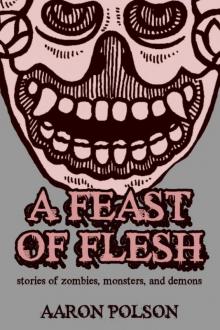 A Feast of Flesh: Tales of Zombies, Monsters, and Demons
A Feast of Flesh: Tales of Zombies, Monsters, and Demons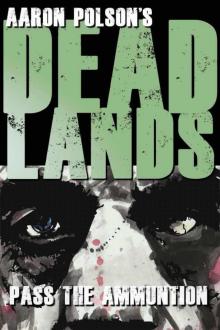 Dead Lands Pass the Ammunition
Dead Lands Pass the Ammunition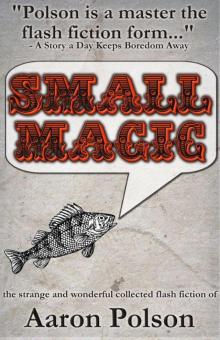 Small Magic Collected Short Stories
Small Magic Collected Short Stories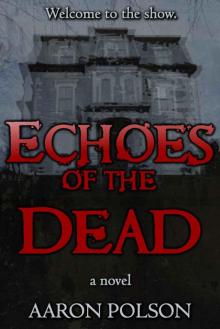 Echoes of the Dead
Echoes of the Dead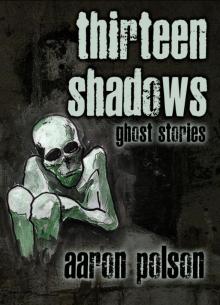 Thirteen Shadows: Ghost Stories
Thirteen Shadows: Ghost Stories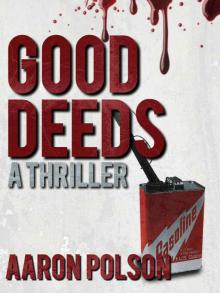 Good Deeds: A Thriller
Good Deeds: A Thriller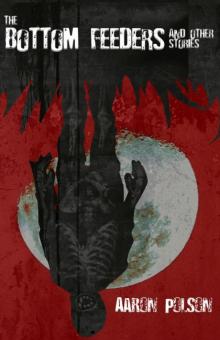 The Bottom Feeders and Other Stories
The Bottom Feeders and Other Stories